ActiveMq
Posted mingyuewu
tags:
篇首语:本文由小常识网(cha138.com)小编为大家整理,主要介绍了ActiveMq相关的知识,希望对你有一定的参考价值。
ActiveMq
文章目录
一、MQ简介
消息队列种类有:Kafka RabbitMQ RocketMq ActiveMQ。ActiveMq是Apache下的一个开源消息队列。
| RabbitMq | 消息堆积支持不好,erlang语言,性能一般 |
|---|---|
| ActiveMq | 老牌MQ,性能不及后起之秀 |
| RocketMq | 实时性好,文档多 |
| Kafka | 兼容性,性能最好,延迟高,不适合在线业务(处理消息时先攒一些,再一起处理) |
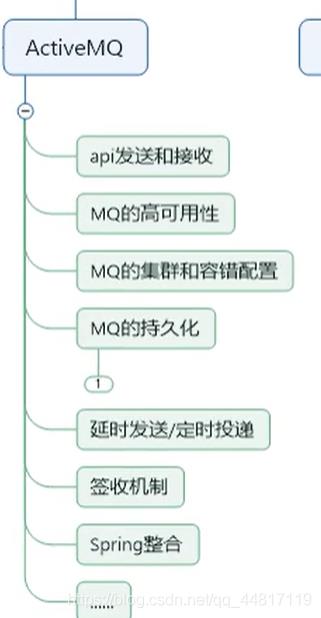
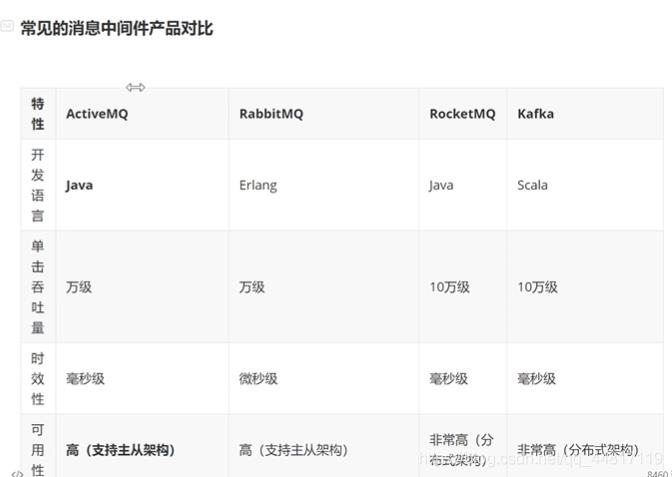
producer: 纯 Java 语言编写的 JMS 接口实现(比如 ActiveMQ 就是)。Java Message Service,java消息服务,是 Java 平台上有关面向 MOM 的技术规范,旨在通过提供标准的产生、发送、接收和处理消息的 API 简化企业应用的开发,类似于 JDBC 和关系型数据库通信方式的抽象。
二、参考文档
| 官网 | https://activemq.apache.org/ |
|---|---|
| 文档目录 | https://activemq.apache.org/components/classic/documentation |
| 安装 | https://activemq.apache.org/getting-started |
| 低版本下载地址 | https://repository.apache.org/content/repositories/snapshots/org/apache/activemq/apache-activemq/ |
三、软件安装路径和端口规划
| 端口 | ActiveMQ’s default port is 61616 监控网站端口:8161 |
|---|---|
| 家目录 | /usr/local/activemq |
| 日志文件 | /usr/local/activemq/data/activemq.log |
| pid文件 | /usr/local/activemq/data/activemq.pid |
| 配置文件 | /usr/local/activemq/conf/activemq.xml |
| 消息默认持久化存储位置(日志存储) | /usr/local/activemq/data/kahadb |
四、安装步骤
1 下载安装包
安装源码包,编译的时候maven报错,不能解决依赖关系,一些jar包找不着,所以下载了二进制包,解压即可使用。
低版本:https://repository.apache.org/content/repositories/snapshots/org/apache/activemq/apache-activemq/
最新版本:https://activemq.apache.org/components/classic/download/
2 解压
tar zxvf activemq.x.x-src.tar.gz
cd [activemq_install_dir]
3 启动activemq
#run ActiveMQ as a foregroud process:
cd [activemq_install_dir]/bin
./activemq console
#run ActiveMQ as a daemon process:
cd [activemq_install_dir]/bin
./activemq start
## 其他命令
./activemq status
./activemq stop
./activemq restart
4 验证运行情况
(1 打开管理网站
url http://127.0.0.1:8161/admin/
用户名,密码都是admin
(2 查看日志文件或控制台输出
tail -200 /usr/local/activemq/data/XXXX.log
#如果运行成功,有如下字段
Apache ActiveMQ 5.11.1 (localhost, ID:ntbk11111-50816-1428933306116-0:1) started | org.apache.activemq.broker.BrokerService | main
(3 查看端口
netstat -antp | grep 61616
(4 ./activemq status
[root@node01 bin]# pwd
/usr/local/activemq/bin
[root@node01 bin]# ./activemq status
INFO: Loading '/usr/local/activemq//bin/env'
INFO: Using java '/usr/local/jdk1.8.0_231/bin/java'
ActiveMQ is running (pid '22261')
5 关闭activemq
cd [activemq_install_dir]/bin
./activemq stop
五、JMS概念理解
1 JMS ( java message service )java 消息服务
java和MQ通信的API叫JMS,java和数据库通信的API叫JDBC
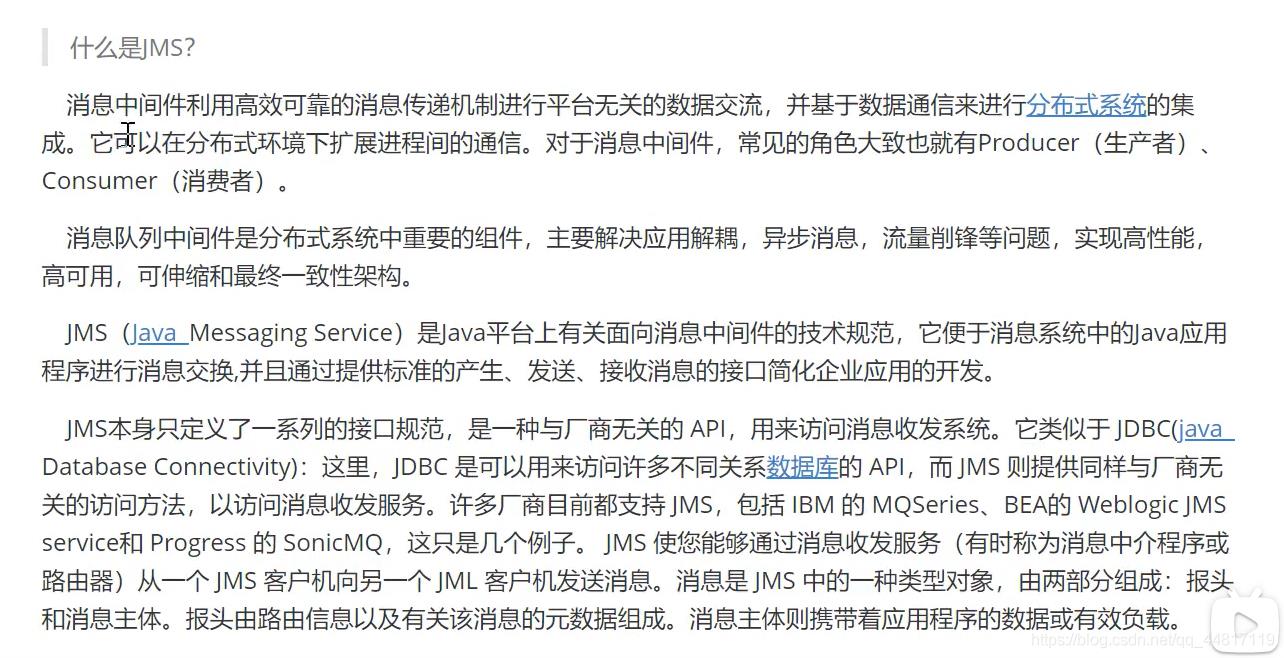
2 JMS消息模型
(1)点对点模型(P2P) queue队列模型
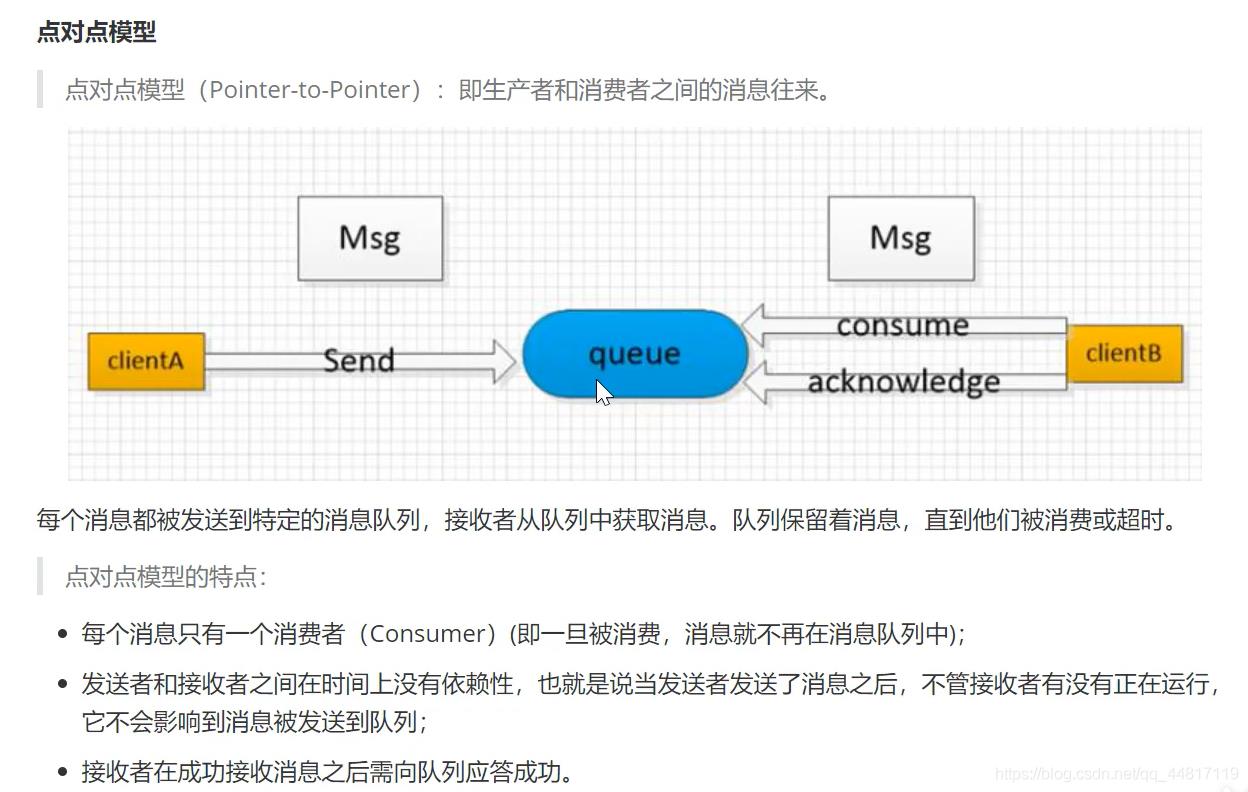
(2)发布订阅模式(Publish/Subcribe),也叫Topic主题模型
包含三个角色:主题(Topic),发布者(Publisher),订阅者(Subscriber)。多个发布者将消息发送到topic,系统将这些消息投递到订阅此topic的订阅者。
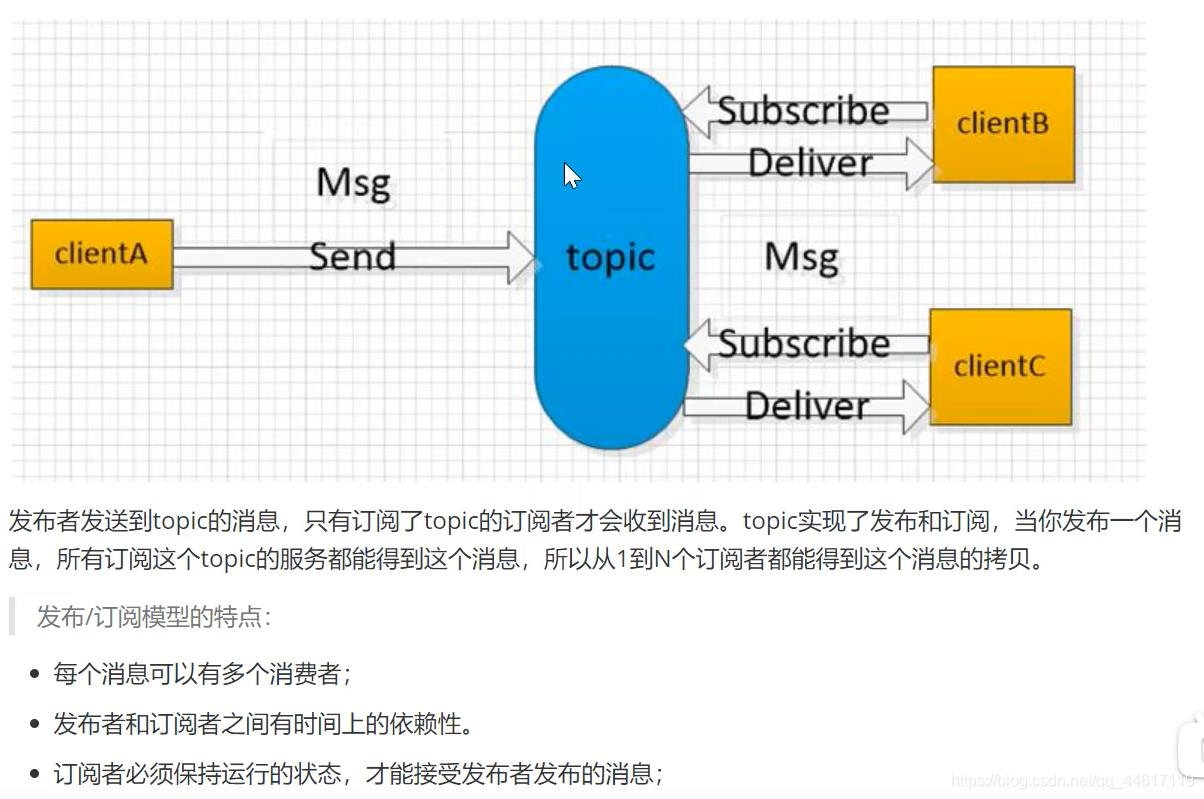
先订阅主题,再来发送消息
3 JMS API图解
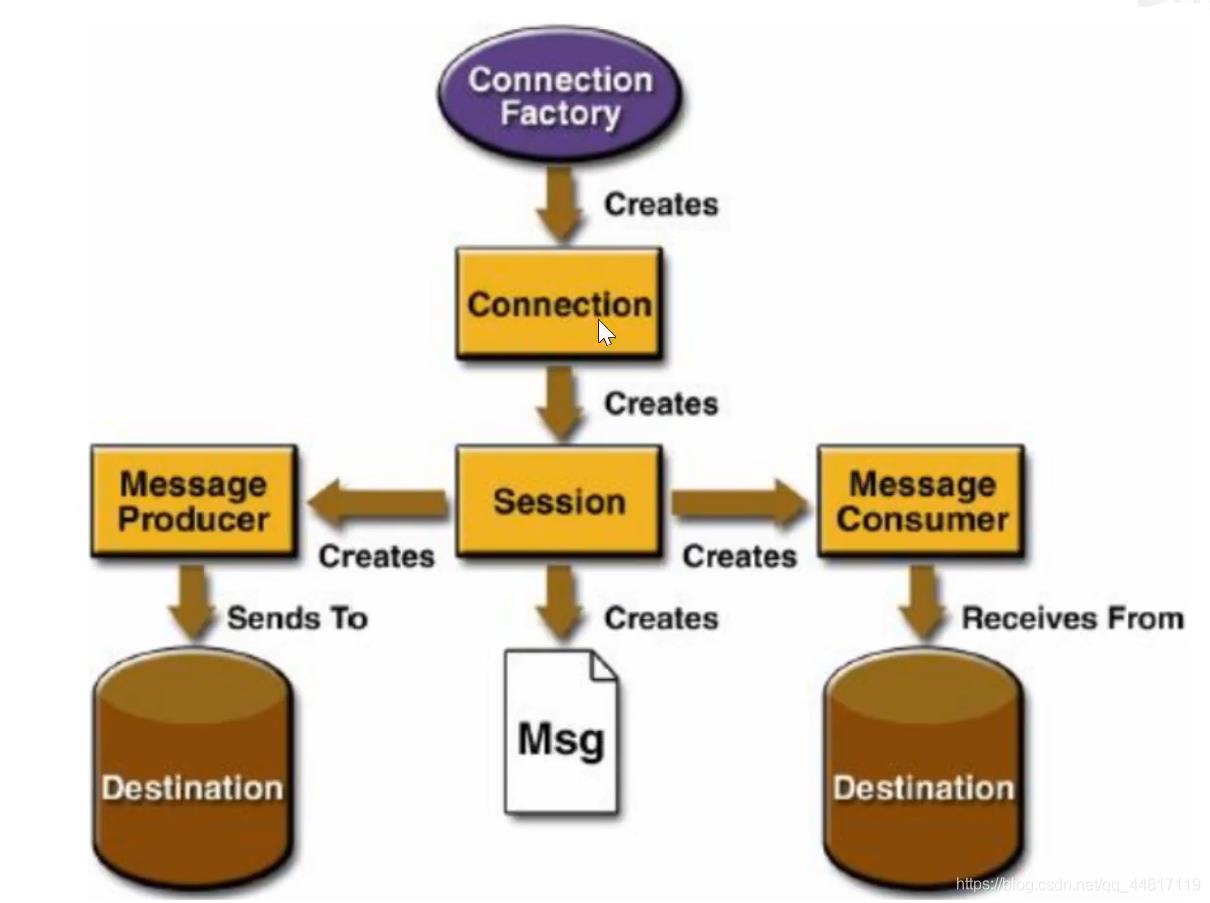
六、activemq消息持久化
参考视频;https://www.bilibili.com/video/BV1vJ41177j1?p=26&spm_id_from=pageDriver
(1 memory
消息存储基于内存的消息存储方式
(2 基于日志消息存储方式
KahaDB是ActiveMQ默认日志存储方式,它提供了容量的提升和恢复能力。
[root@node01 kahadb]# pwd
/usr/local/activemq/data/kahadb
[root@node01 kahadb]# ll
total 40
-rw-r--r-- 1 root root 33554432 Aug 10 17:29 db-1.log
-rw-r--r-- 1 root root 12288 Aug 11 13:21 db.data
-rw-r--r-- 1 root root 12304 Aug 11 13:21 db.redo
-rw-r--r-- 1 root root 8 Aug 10 17:29 lock
(3 基于JDBC的消息存储方
数据存储与数据库中(如mysql)
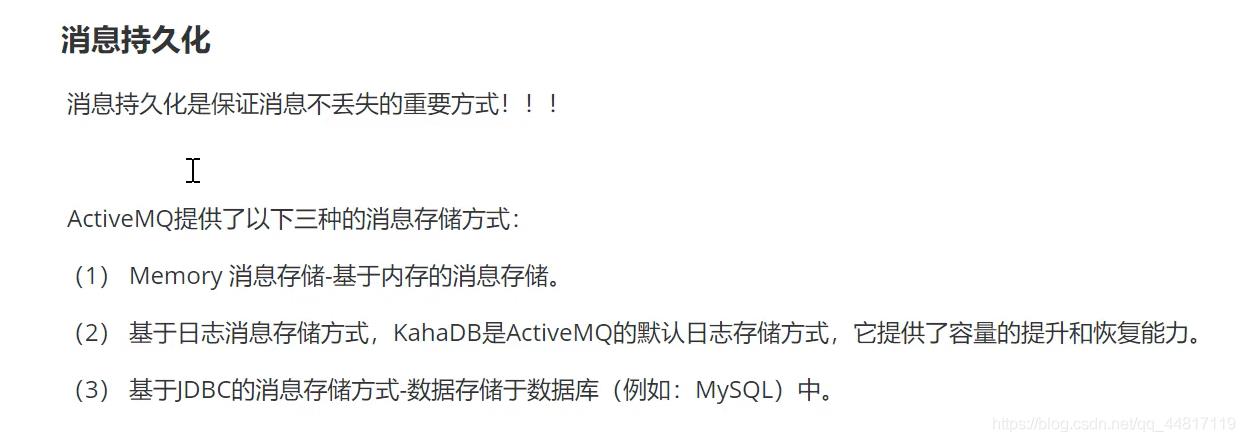
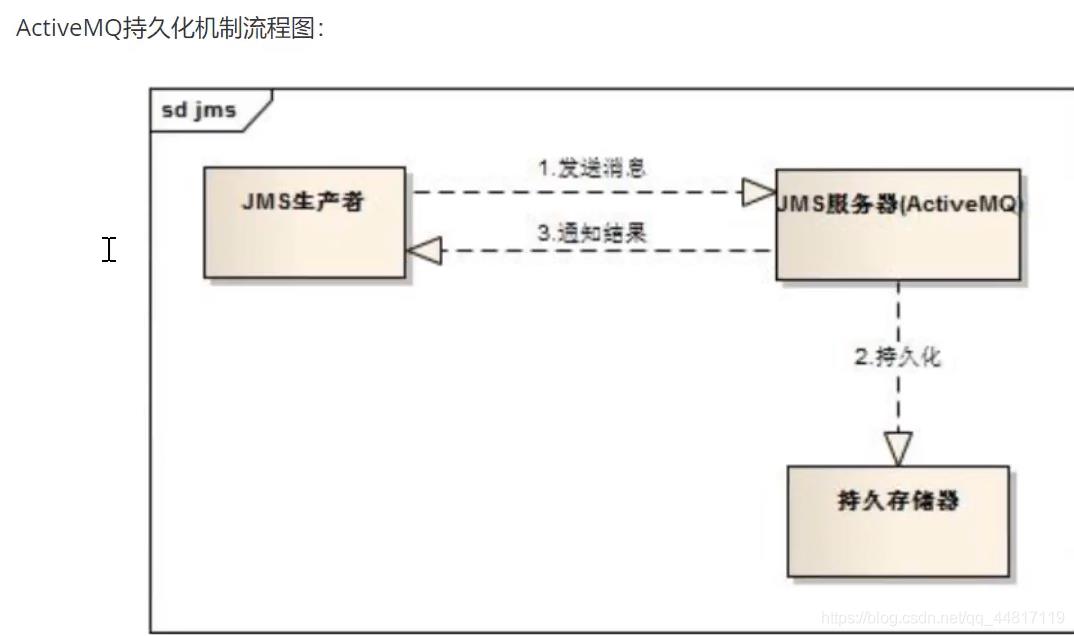
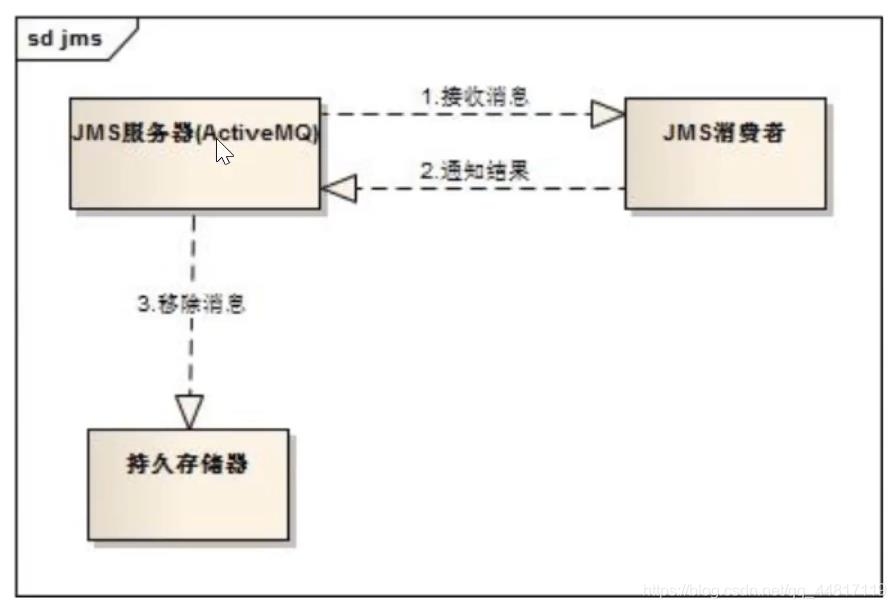
(4 配置 ActiveMq的持久化
在java代码中修改activemq持久化配置 application.yml
在服务器端修改activemq配置文件activemq.xml中的持久化配置器PersistenceAdopter
持久化到日志数据库中

持久化到JDBC数据库中
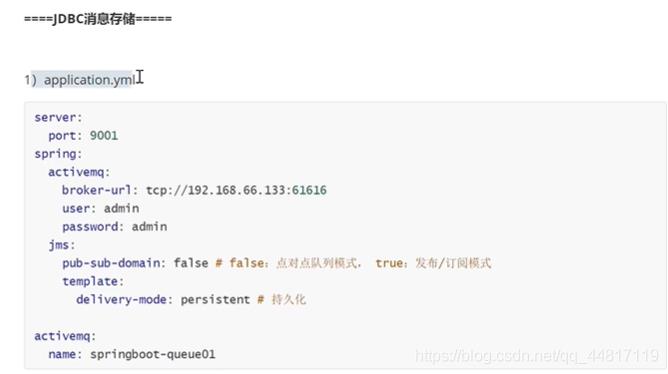
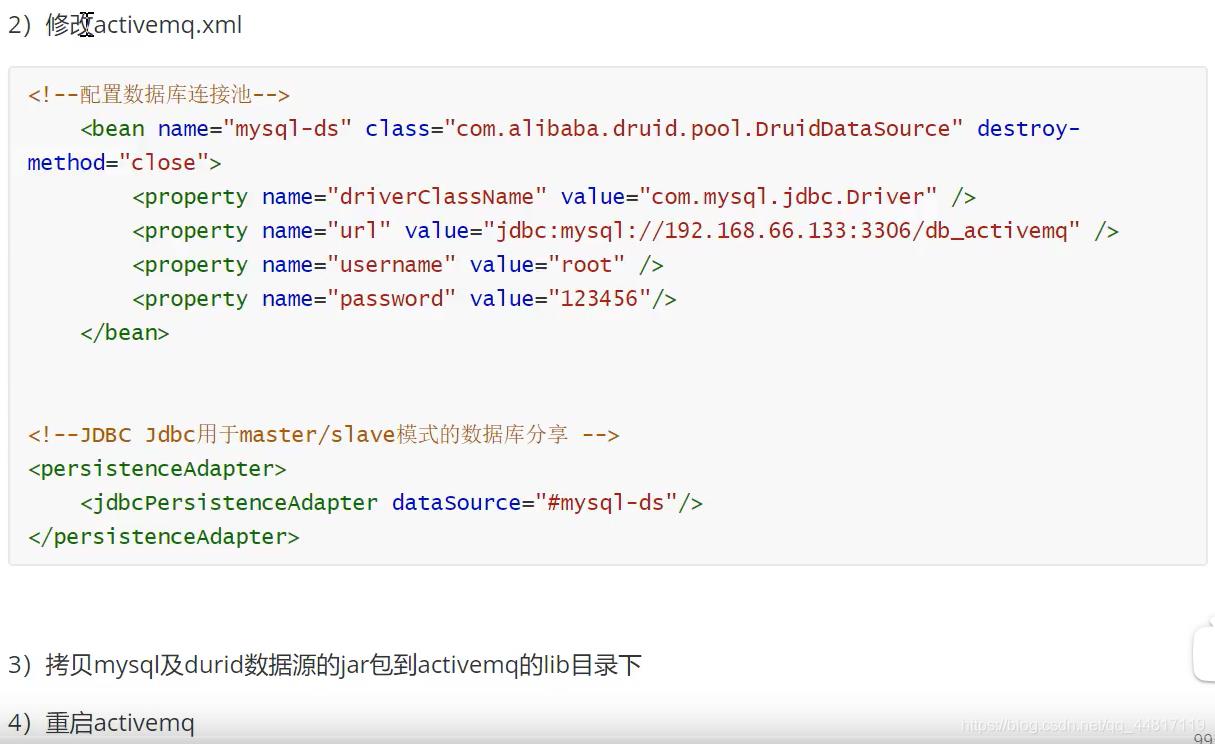
七、activemq配置文件
<!-- START SNIPPET: example -->
<beans
xmlns="http://www.springframework.org/schema/beans"
xmlns:xsi="http://www.w3.org/2001/XMLSchema-instance"
xsi:schemaLocation="http://www.springframework.org/schema/beans http://www.springframework.org/schema/beans/spring-beans.xsd
http://activemq.apache.org/schema/core http://activemq.apache.org/schema/core/activemq-core.xsd">
<!-- Allows us to use system properties as variables in this configuration file -->
<bean class="org.springframework.beans.factory.config.PropertyPlaceholderConfigurer">
<property name="locations">
<value>file:$activemq.conf/credentials.properties</value>
</property>
</bean>
<!-- Allows accessing the server log -->
<bean id="logQuery" class="io.fabric8.insight.log.log4j.Log4jLogQuery"
lazy-init="false" scope="singleton"
init-method="start" destroy-method="stop">
</bean>
<!--
The <broker> element is used to configure the ActiveMQ broker.
配置broker,name,dataDirectory
-->
<broker xmlns="http://activemq.apache.org/schema/core" brokerName="localhost" dataDirectory="$activemq.data">
<destinationPolicy>
<policyMap>
<policyEntries>
<policyEntry topic=">" >
<!-- The constantPendingMessageLimitStrategy is used to prevent
slow topic consumers to block producers and affect other consumers
by limiting the number of messages that are retained
For more information, see:
http://activemq.apache.org/slow-consumer-handling.html
-->
<pendingMessageLimitStrategy>
<constantPendingMessageLimitStrategy limit="1000"/>
</pendingMessageLimitStrategy>
</policyEntry>
</policyEntries>
</policyMap>
</destinationPolicy>
<!--
The managementContext is used to configure how ActiveMQ is exposed in
JMX. By default, ActiveMQ uses the MBean server that is started by
the JVM. For more information, see:
http://activemq.apache.org/jmx.html
-->
<managementContext>
<managementContext createConnector="false"/>
</managementContext>
<!--
Configure message persistence for the broker. The default persistence
mechanism is the KahaDB store (identified by the kahaDB tag).
配置消息持久化策略,内存、日志kahadb、JDBC数据库
http://activemq.apache.org/persistence.html
-->
<persistenceAdapter>
<kahaDB directory="$activemq.data/kahadb"/>
</persistenceAdapter>
<!-- 限制broker对系统资源的使用
The systemUsage controls the maximum amount of space the broker will
use before disabling caching and/or slowing down producers. For more information, see:
http://activemq.apache.org/producer-flow-control.html
-->
<systemUsage>
<systemUsage>
<memoryUsage>
<memoryUsage percentOfJvmHeap="70" />
</memoryUsage>
<storeUsage>
<storeUsage limit="100 gb"/>
</storeUsage>
<tempUsage>
<tempUsage limit="50 gb"/>
</tempUsage>
</systemUsage>
</systemUsage>
<!--
The transport connectors expose ActiveMQ over a given protocol to
clients and other brokers. For more information, see:
http://activemq.apache.org/configuring-transports.html
-->
<transportConnectors>
<!-- DOS protection, limit concurrent connections to 1000 and frame size to 100MB -->
<transportConnector name="openwire" uri="tcp://0.0.0.0:61616?maximumConnections=1000&wireFormat.maxFrameSize=104857600"/>
<transportConnector name="amqp" uri="amqp://0.0.0.0:5672?maximumConnections=1000&wireFormat.maxFrameSize=104857600"/>
<transportConnector name="stomp" uri="stomp://0.0.0.0:61613?maximumConnections=1000&wireFormat.maxFrameSize=104857600"/>
<transportConnector name="mqtt" uri="mqtt://0.0.0.0:1883?maximumConnections=1000&wireFormat.maxFrameSize=104857600"/>
<transportConnector name="ws" uri="ws://0.0.0.0:61614?maximumConnections=1000&wireFormat.maxFrameSize=104857600"/>
</transportConnectors>
<!-- destroy the spring context on shutdown to stop jetty -->
<shutdownHooks>
<bean xmlns="http://www.springframework.org/schema/beans" class="org.apache.activemq.hooks.SpringContextHook" />
</shutdownHooks>
</broker>
<!--
Enable web consoles, REST and Ajax APIs and demos
The web consoles requires by default login, you can disable this in the jetty.xml file
Take a look at $ACTIVEMQ_HOME/conf/jetty.xml for more details
-->
<import resource="jetty.xml"/>
</beans>
以上是关于ActiveMq的主要内容,如果未能解决你的问题,请参考以下文章